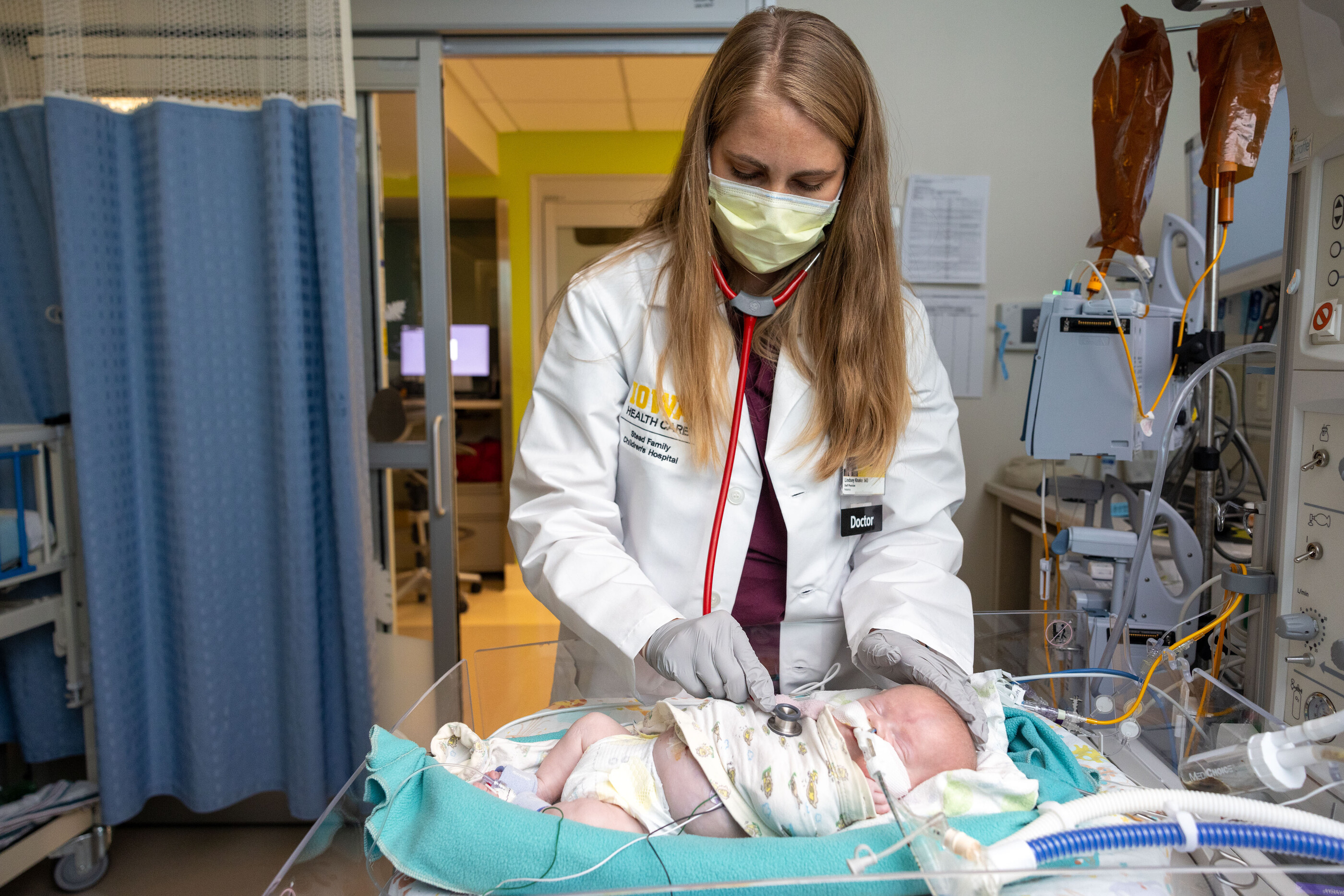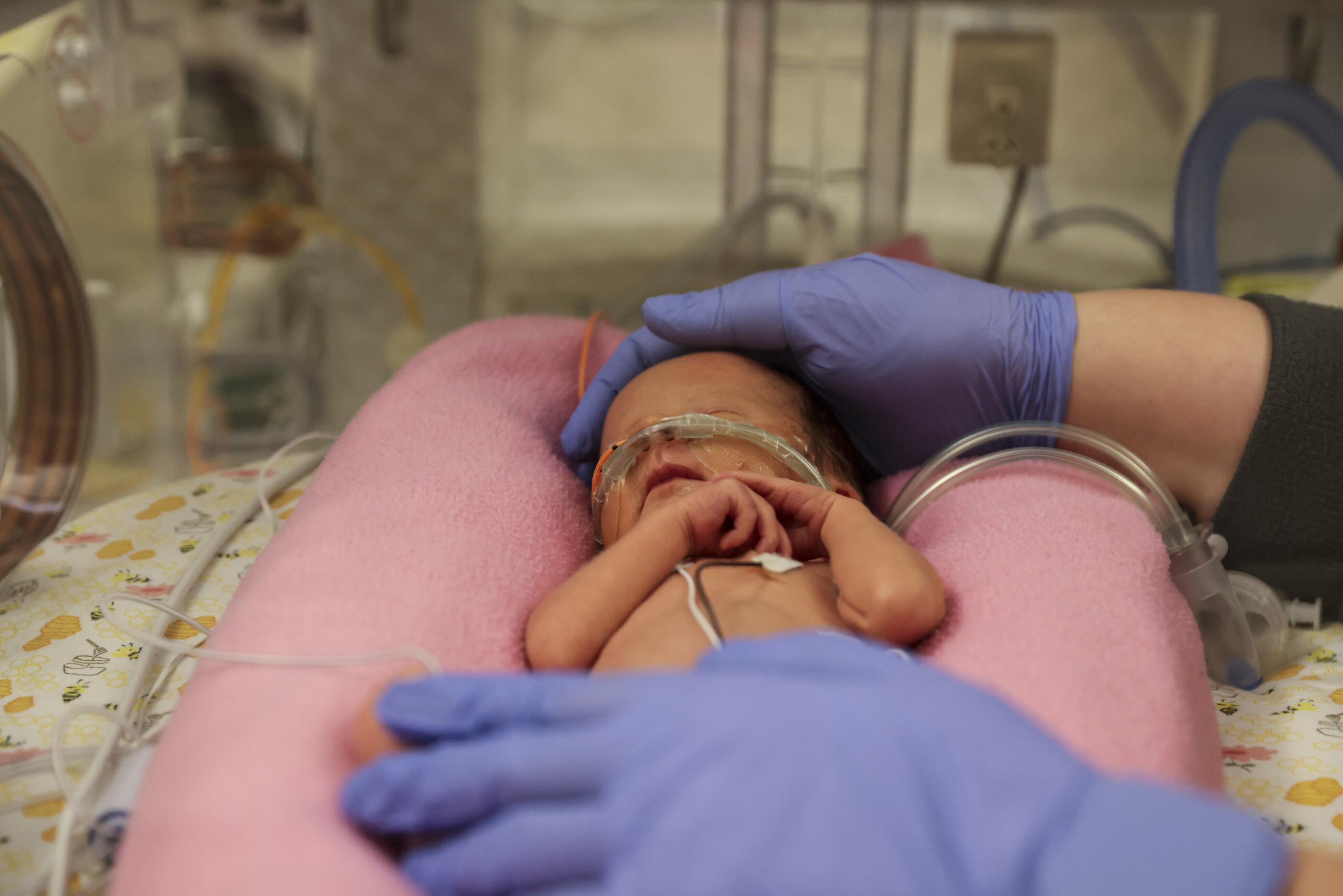Main navigation
Our program has three aims which encompass the tripartite mission of our department.
- Clinical Care: Train outstanding neonatologists to manage the whole spectrum of perinatal-neonatal care, including:
- Fetal care and prenatal counseling.
- Delivery room care.
- Neonatal transport.
- NICU management.
- Post-discharge follow-up.
2. Education: Develop teaching skills through formal education and role modeling.
3. Research: Create lifelong learners by providing the tools to understand and engage in scholarly activity and research.
Over three years, our fellows complete 12 months of clinical service within our NICU with the remainder of their time devoted to scholarly activity. The university setting supports our fellows' academic endeavors.
Orientation
Fellows will spend the first two weeks of July in orientation, which will introduce you to key clinical and research aspects of our program. Orientation will start at the department level and with our GME office before starting with our program-specific orientation. This time will include learning procedural skills and performing a simulation on the Golden Hour.
After the first two weeks of orientation, each first-year fellow will shadow a senior fellow for call night before they do one on their own.
New fellows will shadow senior fellows in the unit for up to a week to learn about the flow before starting in the NICU.
Clinical Experiences
All fellows will rotate into our NICU and our perinatal and postnatal clinics. All clinical activities take place in the University of Iowa Stead Family Children's Hospital.
Our NICU is equipped to care for the tiniest and most critically ill babies, offering the greatest range of neonatal services and support.



Our Level IV NICU is divided into five teams:
Acuity: Highest to lowest
*NCCU stands for Neonatal Critical Care Unit
| Team Name | Description |
|---|---|
| NCCU* A "Hawk" |
|
| NCCU* B "Goldfinch" |
|
| Neonatal Nurse Practitioner (NNP) "Owl" |
|
| Education/Transport (ET) "Stork" |
|
| Level 6 (L6) "Bluebird" |
|
Fellows will rotate in two non-NICU clinics:
| Clinic Name | Description |
|---|---|
| NICU Follow-Up Clinic |
|
| Perinatal Care Clinic (PCC) |
|
On Call Schedule
- Call nights are divided equally among fellows.
- A senior fellow makes the service and call schedule each year with the program director providing oversight.
- All call nights are in-house.
- Each year, there is at least one night covered without any fellows prior to the annual departmental fellow retreat.
Have questions? Read some of our most commonly asked.
Education
Research mentors and Neonatal-Perinatal mentors enhance your training experience and monitor your progress for ways to help you reach your career goals.
Divisional educational offerings include:
| TITLE | FREQUENCY | DESCRIPTION |
|---|---|---|
| LifeLong Learning | Weekly | Includes research and wellness topics, as well as Journal Club, Neurocritical Care Case conferences, M&Ms, and EBM |
| Neonatology and Maternal Fetal Medicine | Quarterly | MFM-NICU combined conference to discuss topics of common interest. Led by a faculty and fellow |
| Cardiology and Neonatal Hemodynamics Rounds | Monthly | Cases presented by Cardiology or Neonatology fellows |
| Fellow Board Review | Weekly | Focus on topics for boards. Run by fellows |
| MFM Fetal Diagnosis and Ultrasound Conference (not required) | Weekly | Case conference run by MFM |
| Pediatrics Dep't Fellow Core Curriculum | Weekly | Covers research, ethics, and teaching topics for Pediatrics fellows. |
| Neuroradiology Rounds | Monthly | Arranged by Neonatal Neurocritical Care team |
| Neonatology Clinical Rounds | Weekly | Discussion of current NICU cases |
| Radiology Rounds | Weekly | Discussion of current NICU cases. Doesn't meet on weeks with Neuroradiology Rounds |
| NICU and Surgery Rounds | Monthly | Topics presented common to the NICU and current surgical patients |
| Grand Rounds (not required) | Monthly | Topics in pediatrics. Run by Peds Department |
Advanced Degree Options
| Name | Description |
|---|---|
| Post-Graduate Program in Translational Biomedicine | One of a few such clinical graduate programs in the U.S., the Graduate Program in Translational Biomedicine (GPTB) trains scientists in the principles and techniques of scholarly, patient-oriented research, including epidemiological and translational research and clinical trials. The GPTB has attracted a stellar team of trainees from a multitude of diverse disciplines and backgrounds, and has proven unparalleled in providing a strong, interdisciplinary core curriculum and expansive cutting edge research opportunities and mentoring. |
| College of Public Health (COPH) | Iowa's COPH helps society respond to new and emerging threats, as well as other long-standing public health concerns, including air and water quality, aging, cancer, health care quality and services, obesity, tobacco, and substance abuse. |
| Masters in Clinical Investigation | A 2-year interdisciplinary program designed for post-doctoral fellows and junior faculty from the Colleges of Medicine, Nursing, Dentistry, and Pharmacy pursuing careers in clinical research. This program is supported by Iowa’s NIH Clinical and Translational Science Award and provides a structured didactic curriculum in research methods in the context of a mentored research experience. |
| Masters in Medical Education | A 2-year program coordinated through the Office of Consultation and Research in Medical Education (OCRME). The program requires the completion of 30 semester hours and is designed for post-doctoral fellows and junior faculty from the Colleges of Medicine wishing to pursue careers in medical education. The program includes all facets of medical education, including the practice and principles of educational research |
Have questions? Read some of our most commonly asked.
Research
Non-clinical time is devoted to research and quality improvement projects. Each fellow participates in a research project that will result in a scholarly work product by the end of their training.
There are many research opportunities available to pediatric fellows, including outstanding training in perinatal research to prepare fellows for careers in academic neonatology. Research training is carried out with experienced investigators in the Stead Family Department of Pediatrics and other departments. Prior fellows have conducted both clinical and laboratory research.
Fellow opportunities in perinatal research include:
- Individualized guidance in the initial selection of their research area and project
- Faculty research and career mentoring
- Research training and support from:
- One of Iowa’s 15 NIH-T32 training programs
- Iowa’s NIH CTSA supported Institute for Clinical and Translational Science KL2 training awards
- Involvement in studies carried out by the NICHD Neonatal Research Network
- Courses in the Graduate College
- Weekly interactive Fellows’ Core Curriculum seminars
Have questions? Read some of our most commonly asked.

Research Quick Facts
- 9 out 20: Neonatology full-time faculty leading research funded by NIH, American Heart Association, or March of Dimes
- 1 of 15: NICU centers participating in the NICHD Neonatal Research Network
- Top 20: Among publicly supported medical schools in total NIH funding dollars
- During our fellowship program:
- 100%: Present work at PAS
- 100%: Publish first-author
- After our fellowship program:
- 54%: Accept academic jobs
- 50%: Stay in academics
Frequently Asked Questions
What quality of clinical training can I expect at the University of Iowa?
While we have traditionally been known as a research institution, we are a full-service clinical division of Neonatology. We have very busy clinical services and a wide range of patient conditions, allowing us to educate our trainees so they are ready for any clinical situation. Fellows completing our program are ready to excel in the highest level NICUs caring for the most critically ill infants.
What makes your NICU so special?
We have an incredible NICU team that works together to provide our patients with the highest level of care. We realize that dozens of people need to make thousands of good decisions for our babies to do so well. We respect our families and our co-workers and we appreciate the various roles that we all play in the outcome of each baby.
How will I identify a research mentor and project?
We realize that you may need help here, and we take your research training very seriously. During the first few months of training, fellows usually meet with several clinical and basic science investigators who have ongoing projects that match their own interests. Should a fellow enter the program with a strong background in research or an identified project, a mentor with similar interests will be identified. A strong mentor-fellow relationship is imperative to success in research.
What benefits can I expect as a fellow?
For the most updated information on paid time off, leave, stipends, insurance, and more, see the Graduate Medical Education benefits webpage.
What is there to do in Iowa City when you're not working?
There are 15 different festivals and art fairs, plus concerts and race events. There are many music venues, sports events and neighborhood street fairs and garden walks. We also have a really big mall and several smaller ones, 41 parks, 9 golf courses, 6 public tennis courts, 6 public pools, some lakes and a reservoir with trails, camping and boating. There are bike trails, some famous bookstores, a ton of galleries and excellent museums. There are half a dozen or more performing arts venues including Hancher Auditorium. There's always something going on.
Where is Iowa City?
Iowa City is 220 miles directly west of Chicago on Interstate 80. It's also within a 4-5 hour drive to Milwaukee, Madison, Minneapolis, Omaha, Kansas City and St. Louis. It has the cultural, educational, social and political opportunities of a bigger city with the values and ambiance of a midwestern town. Nothing is farther than a 15 minute car ride, it has a great city bus system (with bike racks!), wonderful parks, sports, schools and even sailing. Those who have previously lived here often return because what they were looking for was in their own backyard.
What's Iowa City like for kids and families?
There's ice skating, bowling, organized sports, 50 public parks, miniature golf, a great public library, a toy library, fun centers, swimming pools and 3 beaches, 9 museums including a children's museum, dance companies and public recreation centers that feature many activities for kids and families at little or no cost. We also have 20 movie screens and 50 licensed daycare providers. The Iowa City schools are perennially ranked among the top schools in the nation. Iowa City is unique in the facilities and services available for individuals with disabilities. Many families who have a family member with a disability are reluctant to leave Iowa City because they cannot duplicate those services in another location.